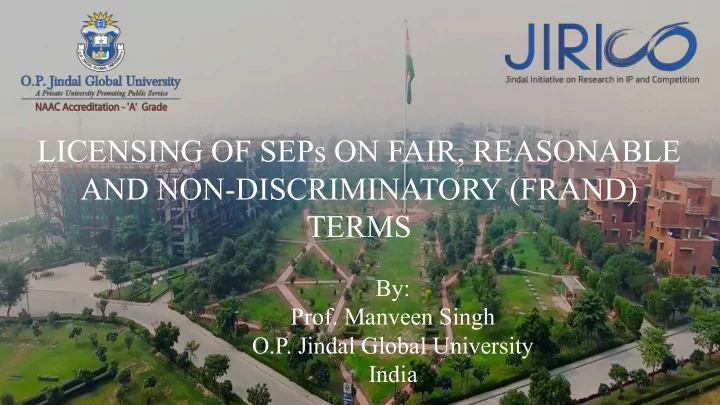

LICENSING OF SEPs ON FAIR, REASONABLE AND NON-DISCRIMINATORY (FRAND) TERMS By: Prof. Manveen Singh O.P. Jindal Global University India
ST STAND ANDAR ARDS-SE SETTI TING AT A A G GLAN ANCE Standards development process- inclusion of patent-encumbered technology Licensing of patents essential to the standard on FRAND terms Increased market power- possibility of “hold-up” Lack of precise definition of FRAND
FRAND I IN N TH THE SE SEP C P CONTEXT AS A PART OF LICENSING OBLIGATIONS AT SSOs FRAND AS A PART OF LICENSING DISPUTES
LICENSIN ING OB OBLIG LIGATIO IONS AT S SSOs FRAND- common feature of SSO IPR policies IEEE IPR policy changes of 2015 Definition of ”Reasonable Rate” Apportionment based on the value of smallest saleable Compliant Implementation Favourable BRL from the Antirust Division, US DOJ Challenges to the amended policy
FRAN AND IN L LICENSI SING D DISPU SPUTE TES Position in the US- Microsoft v. Motorola In re Innovatio Ericsson v. D-Link CSIRO v. Cisco TCL v. Ericsson Position in the EU- Unwired Planet v. Huawei
APPR PROPR PRIATE TE ROYAL ALTY TY B BASE SE SSPPU or EMVR? Courts in the US divided EMVR the governing rule in the UK
WHAT I T IS “ “FAI AIR”, “ “REASO ASONAB ABLE” & & “NON ON-DIS ISCRIM IMIN INATORY” I ” IN FRAND? FAIR- No attempts in the US- RAND instead of FRAND Fairness not touched upon in Unwired either Rawl’s Theory of “Justice as Fairness” Equal distribution of goods unless unequal distribution is to the advantage of everyone, especially those who stand to have the least Social and economic inequalities justified only in cases where the least advantaged stand to benefit from such provisions Burden to be borne equally by innovators and implementers
REASO SONAB NABLE Ex-ante v. ex-post US- value of technology prior to incorporation in the standard UK- royalty should reflect the patented technology’s value to the standard Choice of the royalty base
NON ON-DIS ISCRIM IMIN INATORY Reference royalty rate for comparable licenses New licensees might be charged a higher or lower rate Rates negotiated ex-ante should continue ex post Harm to competitor- reflection of (non) discrimination
WAY F Y FOR ORWARD Purpose of FRAND- balancing the interests of innovators and implementers Lack of common ground on FRAND between courts and SSOs Need for SSOs to step up and bring clarity to their IPR policies Competition agencies could lend a helping hand
Recommend
More recommend